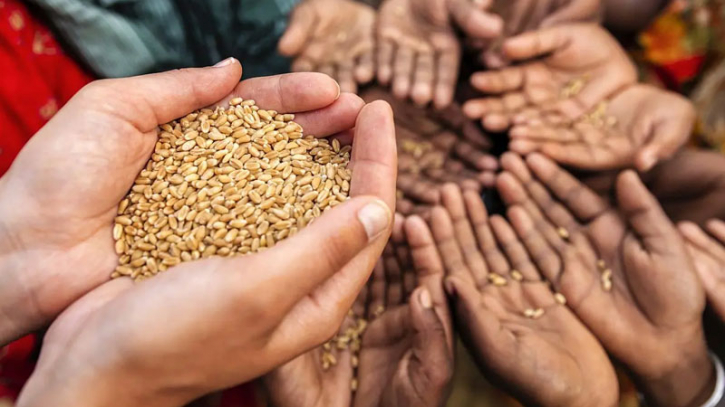Bangladesh ahead of India, Pakistan in global hunger index

Concern Worldwide and Welthungerhilfe jointly publish a peer-reviewed annual report called the Global Hunger Index, a tool for comprehensively measuring and tracking global, regional, and national hunger. Bangladesh has made progress in terms of scoring in the Global Hunger Index with continuous development in cutting child undernourishment. In the 2023 index, Bangladesh ranks 81st out of the 125 countries with sufficient data for calculation, down from 76th among 116 countries in 2022. With a score of 19.0 in the 2023 Global Hunger Index, Bangladesh has a moderate level of hunger. The country’s score was 19.1 last year.Higher scores mean less improvement in the index. Based on the score, Bangladesh is in a better position compared to Afghanistan (30.6), India (28.7), and Pakistan (26.6) in South Asia.
GHI scores are based on the values of four component indicators. The indicators are:
-Undernourishment: the share of the population with insufficient caloric intake.
-Child stunting: the share of children under the age of five who have a low height for their age, reflecting chronic undernutrition.
-Child wasting: the share of children under the age of five who have a low weight for their height, reflecting acute undernutrition.
-Child mortality: the share of children who die before their fifth birthday, partly reflecting the fatal mix of inadequate nutrition and unhealthy environments.
Based on the values of the four indicators, a GHI score is calculated on a 100-point scale reflecting the severity of hunger, where 0 is the best possible score (no hunger) and 100 is the worst. A higher score indicates a higher rate of hunger, while a lower score indicates improvement or a lower rate of hunger. Scores above 50 are considered highly alarming, 35–49.9 alarming, 20–34.9 serious, 10–19.9 moderate, and below 9.99 is regarded as low hunger or a good situation.
Each country's GHI score is classified by severity, from low to extremely alarming. The top ten countries with the least hunger in this year's index are Belarus, Bosnia and Herzegovina, Chile, China, Croatia, Estonia, Georgia, Hungary, Kuwait, and Latvia. The bottom nine countries where hunger is alarming are South Sudan, Burundi, Somalia, the Central African Republic, Madagascar, Yemen, the DR Congo, Lesotho, and Niger.
Bangladesh has shown visible improvement over the past few years. The country has shown a significant improvement of 25.5% from 2014 when its GHI score was 26.3, and it was considered serious. Since 2014, its undernourishment, child stunting, and child mortality rates have all declined. Child wasting, rated high in previous years, has also dropped to a current level of 9.8%, compared to 14.4% in 2014. The country's steady decline in child stunting in recent decades is still a remarkable success. It can be attributed to rising household economic development due to pro-poor economic growth, gains in parental education, and improving health, sanitation, and demographic factors. However, the current child stunting level of 28.0% is still defined as high for public health significance.
According to the report, Bangladesh's progress in the hunger index has been achieved by reducing the birth rate of malnourished and stunted children. Bangladesh is among the seven countries that have reduced their index score by 5 points or more since 2015. The report said that these reductions in hunger are particularly impressive given the challenges facing the world and the stagnation in hunger levels at the global level in recent years.
However, hunger has been a problem our nation has grappled with ever since independence. While our progress in the Global Hunger Index can be considered a standard with which we can measure how well we are doing compared to other nations, unless and until we can overcome our own problems with food scarcity and insecurity, such progress will mean little. A good case in point would be the sheer shock our nation had to endure due to the supply chain of essential goods being halted by Russia's invasion of Ukraine last year. The incident led many nations with whom Bangladesh retains trade relations to withhold exports of staples such as wheat. It is quite encouraging to learn that Bangladesh, a country on the verge of collapse in 1974 because of a severe famine, is now steadily climbing the Global Hunger Index. Our nation is ahead of some of our most immediate neighbors, such as India and Pakistan, in terms of ranking. Although the country's trend has improved over time, the climate crisis is becoming an increasing threat to food and nutrition security due to rising sea levels, extreme weather conditions, and devastating floods. These factors, combined with existing challenges such as poverty and inequality, mean that the poorest sections of society, already suffering from hunger and poverty, are often the worst affected.
Following this, Bangladesh will need to become increasingly self-reliant when it comes to food production. Immediate measures must be taken to stop food waste, improve food storage facilities and transportation networks, and cultivate land for food production. In this, we can all play a role, but the relevant authorities must play the leading role in implementing the government's directives. Far too many glaring discrepancies remain in this regard. For example, while the PM has asked that every bit of cultivable land be used for food production, the latest DAP for Dhaka allows for construction on the little agricultural land left on the city outskirts based on certain conditionalities. Such gaps between policy and action must be urgently plugged in if the issue of food scarcity is to be dealt with effectively.
While scarcity is an important aspect to tackle in the war against hunger, we must also take into consideration the issue of adulteration. Unfortunately, adulteration of food has maintained its presence as a threat to the general population's health, and it is a problem that spares no one. The government must start ramping up food testing and indeed make it a core pillar of any and all plans to end hunger, such as the Zero Hunger by 2030 SDG. Also, food inflation has become increasingly common in recent times. Precautions must be taken to survive in such inflationary conditions by individuals, companies and governments.Our nation's march towards middle-income status cannot shirk the responsibility of ensuring that each and every citizen has enough to eat to lead a dignified life.
Writer: Mehjabin Banu is a teacher and a columnist.
Source: Daily Asian Age.
.png)




